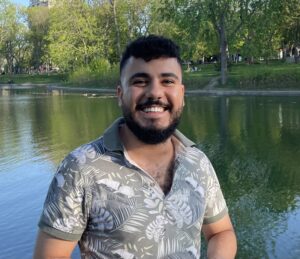“Now that we’ve been seeing each other for three weeks, should we be exclusive?”
« Oui, parce que je vais pas rester avec toi si tu veux voir un autre homme. »
“Sounds good.”
Henrique and I spoke best in the absence of a common language. I was able to understand French but spoke it poorly, and he understood English but didn’t speak it well. We made little sense to each other when we spoke the other’s language, so we decided to speak different languages, finding harmony only in difference.
I stumbled upon Henrique on Grindr, out of all places, on December, 30th of 2021. I texted him first.
“I love your lips,” I typed.
“I love all about you,” he replied.
His face was soothing—handsome, with an affable smile. I was bored and alone in Montréal, having no plans for the night, after my friends left the city for the holidays. I invited him to come over to my apartment to chat or hook up, depending on what he preferred. He said he wanted to suck me off, and asked for my address. I only gave him the street name and the intersection at which I suggested we meet. I felt unsafe giving my exact address to a stranger.
« Je suis là » he texted once he arrived.
I put on my jacket and went out my apartment to meet him. He looked anxious, under the soft snow. I smiled at him. We embraced—touch communicating his warmth and what words fail to capture. I asked him about his walk as we climbed up the stairs; he said it was lovely. I offered him tea and chocolate when we got inside.
« Non, merci, » he refused, smiling—his face still red from the cold.
I lay down on one end of the couch as he sat on the other end, caressing my feet. We chatted for more than an hour. He spoke a mixture of French and English and I spoke a lot of English and some French, all meanings retrieved in the lack of translation. I kissed him abruptly during our conversation. He undressed me, kissing my body, and we had oral sex for two hours thereafter. I wiped away his tears and kissed his forehead throughout, interrupting the sex with hugs. I walked him back to his apartment, holding hands, kissing at every traffic light.
“Do you smell le beurre?” he chuckled whenever we passed by a bakery, raising both hands, imitating a chef’s kiss.
We promised to see each other again.
Overture in the Ashes of Alphabets and Acronyms
I met Henrique at a time when I was burdened by language. As a man of multiple marginalized and politicized identities, I’m inundated with new terminology and acronyms (with more letters than my mouth can pronounce) in which I’m included without my consent. This is predicated on the false assumption of my automatic membership in groups that are increasingly obsessed with semantics and performativity over actions, as if liberation and equity are achieved through phraseology. I’ve grown tired of being addressed by total strangers with incomprehensible acronyms or as a member of their community, or worse, chosen family on the presumption of a shared politicized identity, so much so that I sometimes wish I’d never learned English. Such acronyms and labels amplify the most privileged within minority groups, disregarding the lived experiences of low-income people and immigrants, and, at times, constructing new identities that homogenize diverse populations for merely performative purposes. Henrique’s inability to speak English well provided an escape from a language that had been constraining me for a while. The absence of a common language between us also presented itself as an intellectual experiment on whether love can grow without a language.
Henrique, too, was an immigrant and, like me, he had a tough childhood. He shared the same frustrations with political performativity and the lack of progressive and liberatory politics in Canada. I was brought here as a minor at fourteen by my mother, twelve years ago. Henrique, now thirty-two years of age, moved here as an adult by himself in his early twenties. Even though both our immigrant experiences were different, we had a few similarities: we didn’t complain about the metro being three minutes late, because buses in Brazil could be late for hours and Libya lacked a public transportation system; we didn’t buy into the facile North American framework of identity politics and frivolous social justice rhetoric undermining actual struggles of racialized and queer people; and we knew that belonging, as discussed in Canadian discourses, was a myth.
I moved from Victoria to Montréal in September of 2021 because I wanted to live in a bigger city and explore a different linguistic dimension to love, that is to love and be loved in a language other than English. I thought I’d learn French and have a boyfriend to love me in Arabic, my thus far loveless mother tongue, and to engage in intellectual discussions with me in English. Arabic was too far back in my head now that I knew I needed English to be present. “Love me in Arabic,” I dreamt of professing prior to meeting Henrique. “Love me in the absence of a common language,” I now said.
Joy in Eyes Reflecting the Universe
After our first encounter, Henrique and I went to each other’s apartments every Wednesday and Sunday. At the time, there was a curfew in the province of Québec, which encouraged us to hold each other through the night, since leaving before 10:00 pm was too early. I missed the insomniac walks I used to go on before the curfew was enforced, but I found solace in Henrique’s embrace, especially in my friends’ absence. I loved watching Henrique explore my body. He caressed and kissed every inch of me with such delicacy that it brought tears to my eyes every time. I loved kissing his body, too, licking his sweat, and asking him how he wanted to be touched. I loved his dark irises, clearer than a mirror, reflecting my face and the most intricate details of the frames on the wall behind us, as though he contained the universe within his eyes. I loved his smile in the shower, his wavy hair in between my fingers, and his shyness in the early mornings, avoiding eye contact for hours after waking up. When we were together, we read through Jacques Prévert’s poetry collection, Paroles, each of us analyzing the poems in his respective language. We casually quoted his verses in conversation and over text.
« Cet amour/Beau comme le jour » Henrique would say.
« Et mauvais comme le temps » I’d finish.
I wasn’t required to perform misery in Henrique’s presence. A rare occurrence for a gay, Brown, Arab, Muslim, immigrant in a society that not only attempts to deny me joy through its various injustices, but also demands of me a constant performance of sadness and a futile search for belonging in its performative identity politics. Misery isn’t so much an adversity but rather an identity. Striving toward a happy life, or worse, having managed to create one is forsaking a core identity. My well-earned joy is perceived in our reductive, identity politics obsessed culture as dismissing the suffering of others rather than a triumph over suffering. Henrique loved me for my joy and I loved him for his.
« Tu m’apprends que je peux être aimé pour ce que je suis, que je suis plus aimé quand je suis pas parfait » Henrique proclaimed repeatedly. It was different for him to be loved with no expectations and it was his solace in a society where he, too, was under pressure to perform misery or, at lesser times, a sort of jovial gratitude anticipated of immigrants like him and me. He didn’t know why people assumed he missed Brazil, a country he left voluntarily, or why they expected him to nod to their privileged problems. He often chanted the title of the Spanish song, “Soy lo que soy.” He’d then continue, « je suis ce que je suis, » “I am what I am.” He’d say the title in three languages and I loved him for who he is in the absence of a common language. Henrique and I were comfortable with not fully belonging, not even with each other, for we understood that a part of our histories would be negated in search of belonging, and that much like our love needed to exist outside the confines of language, we too had to thrive away from society’s delusional expectations.
Guiding One Another’s Hearts in the Absence of Breath
I felt so much love for Henrique and I knew that he loved me back. I was, however, unsure if I were falling in love with Henrique as a boyfriend or a friend, and I was worried we were bonding over our burdensome childhoods, even though our romance was truly centred around joy. He was also looking for a long term relationship and I was undertaking an intellectual experiment of love and language. I felt that we viewed our bond differently: I enjoyed it for its foreseen brevity and Henrique believed it would last long term.
“I think we’re meant to be friends, not boyfriends,” I interjected when Henrique was in the middle of sharing a story over dinner, a month and one week after our first encounter.
“I gonna take the dishes,” he said in broken English and went to the kitchen.
I waited on the couch until he sat beside me. I put one hand on his back, the other on his chest.
“I’m not saying we should break up, but I don’t see our romance lasting for longer than another month. With everything I know about you,” I confessed, tearing up, “it would be cruel on my part to continue something that might hurt you.”
He put his head in his hands, much like the poet-speaker in “Déjeuner du Matin,” which we read together, and he cried. His tears made me breakdown, too.
« Merci pour tout »
« Tu vas me manquer »
« Je comprends »
« Je te porterai dans la valise de mes souvenirs »
« Tu vas avoir une belle vie »
He repeated such remarks as we wept for hours. I held him through his sleep, assuring him I’d continue to be in his life. I woke up to him crying. We took one last shower together and I asked him to walk me to Parc La Fontaine.
At the park, we stood by a bench facing each other. He held my hands and sobbed, « pourquoi? pourquoi? » under the soft snow. I put my hand on his heart, and guided him to place his hand on my heart.
“I love you,” I uttered.
« Je t’aime » he said, « tu vas toujours rester dans mon cœur. »
“You’ll always be in my heart, too, Henrique. I’ll wait here by the bench as you walk away.”
We embraced, crying. He took a few steps and I followed to embrace him again.
« Au revoir, mon chéri »
“Goodbye, Henrique.”
I stayed by the bench until he disappeared into the distance.
Poetic Errantry of Bodies Beyond Words
« C’était comme un rêve » Henrique said after our breakup, but I think it was more like a trip than a dream, an immigration of a sort, in which we had to find a new terrain for love to grow, to envision uncharted possibilities, resembling perhaps both of our immigrant experiences in which we still existed beyond societal categorizations and countries’ abilities to truly contain us. I’m unclear why ending my romance with Henrique was such a poignant experience, since all of my antecedent romantic breakups weren’t. Perhaps life is just sadder in French. Henrique once told me to hurt someone is to rip the poetry off his body, so I broke up with him the moment I realized I could take away more of his innate poetry. I wanted for the unspoken alphabet to remain inscribed on Henrique’s flesh, for my love for him to preserve the indecipherable verses on his body and mine.
…
 Nofel (نوفل) is a Montréal based poet and essayist, writing in English and Arabic. His poetry and essays have most recently appeared in Contemporary Verse 2, The Ex-Puritan, Canadian Notes and Queries, and the League of Canadian Poets, among others. Nofel is currently learning French and simultaneously working on poetry and nonfiction manuscripts. He was longlisted for the CBC 2022 Nonfiction Prize.
Nofel (نوفل) is a Montréal based poet and essayist, writing in English and Arabic. His poetry and essays have most recently appeared in Contemporary Verse 2, The Ex-Puritan, Canadian Notes and Queries, and the League of Canadian Poets, among others. Nofel is currently learning French and simultaneously working on poetry and nonfiction manuscripts. He was longlisted for the CBC 2022 Nonfiction Prize.






